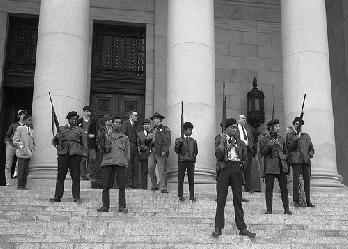Like many progressives, I've been pondering: when is resistance appropriate, and when should we continue working with those with whom we seem so fundamentally to disagree? Recent events, I confess, have worn down the empathy that has long been my cornerstone principle. Like many, I couldn't fathom the votes some people cast -- in my case, not immovable Republican supporters, but those who previously voted Democrat, but for some reason voted Trump, supported progressive candidates with no chance of winning, or didn't vote at all.
Yet, for the sake of social justice outcomes, I've concluded: we have to keep empathizing with at least some of this apparent middle ground. I see the utility of this approach particularly in one of our country's fieriest cultural debates: gun violence -- a field in which I work, as a minority attorney in Atlanta where I grew up, focusing on Southern and Midwestern states.
It's no surprise how far gun rights advocates have advanced their agenda. Tellingly, the Executive Director of the ACLU -- an organization protecting the entire Constitution -- recently revealed that the ACLU's membership is still only half the NRA's -- an organization dedicated to the Second Amendment alone.
But opinions on guns aren't monolithic, even among the NRA. For example, many gun owners believe guns don't belong in schools, despite what a vocal minority (and Trump) might have people think. Equally underappreciated is that racial minorities, too, hold differing opinions on guns. Despite bearing the brunt of gun violence, many see an appeal in gun ownership, driven, among other things, by mistrust of police. To them, this view on guns isn't regressive, but radical, as radical as the armed Black Panthers.
The existence of complex beliefs on guns is why I've launched a Call to Arms Empathy -- an initiative calling people to understand diverse perspectives about guns across geographical, cultural, and racial divides. Despite shootings from Sandy Hook to Orlando, our country hasn't come even close to a "tipping point" on guns. In states like Georgia, gun policy has actually gotten worse. It's clear that, to have any chance of moving the needle, we must appeal to people who do see some -- though not absolute -- value in firearms.
In my view, this alternative "third" way of approaching guns is ultimately consistent with the concept of resistance -- here, resistance against our country's tragic levels of gun violence. People who want to repeal the Second Amendment are frustrated with how some have interpreted this right. But their goals need not be inconsistent with those who say they "support" the Second Amendment, either. One can recognize that self-defense is an important principle, and that many gun owners don't harm others -- while also believing that firearms restrictions are valid, for limiting hurt others do cause.
Reconciling these beliefs is admittedly challenging, because it requires acknowledging a radical and nuanced concept of what being "pro-life" means: self-defense matters, though not for its own sake, but because it is situated within a broader right to human life that all people possess -- whether they carry a gun or not. Each person is unique in constitution, yet all possess arguably the most powerful force known to us -- the will to live. So, each human life has immutable, infinite, irreplaceable, and yet somehow equal value, irrespective of even repugnant belief or action.
If all lives matter equally, then, our morality should permit the taking of life where a physical threat to another exists. Force should absolutely not be permissible otherwise, of course -- which happens far too frequently with guns. Yet, it's also necessary to acknowledge that the crimes (and the oft-underappreciated accidents and suicides) involving guns are also results of systemic racism, economic and health disparities, and other social cleavages. It's ironic, then, that many policy proposals to end gun violence often only stigmatize minorities, people with mental health problems, and those with prior convictions -- people who actually pose no greater risk armed than anyone else.
Is this kind of affirmation tantamount to tolerating what is fundamentally contrary to principles of right? I maintain: no. Some people have somewhat, but not totally different viewpoints on how to value and protect human life. By understanding rather than oversimplifying their deepest moral commitments, we can encourage them to speak, rather than sit out. In doing so, we can overcome the vocal minority -- particularly in the places I work, where there are simply more of them.
(Note: You can view every article as one long page if you sign up as an Advocate Member, or higher).





